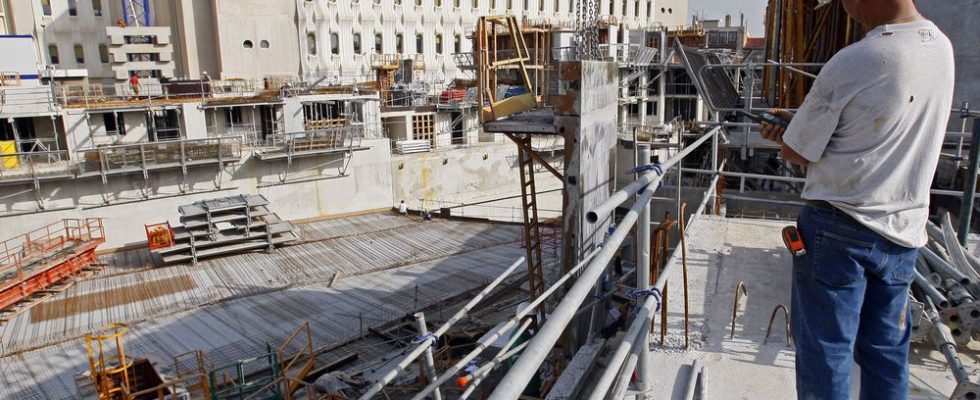The crisis intensifies in new housing. At the end of March 2023, the number of new housing permits issued in one year fell by 11.5%, to 441,400, according to data revealed on April 28 by the Ministry of Ecological Transition. This is a steady decline since the August 2022 record (525,300) due to regulatory deadlines. The number of construction sites started, which traditionally follows that of building permits, fell by 8.3% over one year, to 359,200. A total mainly pulled down by single-family homes.
As of March 9, the Federation of Real Estate Developers (FPI) sounded the alarm bell. According to her, sales to individuals fell by almost 40% in the last quarter of 2022. Year-on-year, sales to individual investors fell by 26% and sales to homeowners fell by 13.4%. Over the whole of 2022, new home reservations recorded by the REIT fell by 24.6%, even climbing to 36.3% in the fourth quarter.
“Psychological withdrawals”
“The trend is getting worse,” notes L’Express Pascal Boulanger. The president of the REIT expects a drastic drop in building permits in the first quarter of 2023: -30% compared to the first quarter of 2022. More and more developers prefer to postpone the launch of certain projects, or even give them up. “About 18% of real estate transactions are not made for economic reasons”, he specifies.
In addition, the withdrawal rate – in other words a person who signs a reservation contract but does not go through with it – has increased from 13% to 27% in 2022, notes Pascal Boulanger. He expects this figure to reach 40% in the first quarter of 2023. “We see a lot of customers who withdraw just forty-eight hours after making a purchase”, he notes, referring to “psychological withdrawals” .
“The predicted disaster has arrived,” also alarmed AFP the president of the French Building Federation, Olivier Salleron. “If we continue with the same parameters, we are heading towards a disaster”, judge for his part Loïc Cantin, the president of the National Federation of Real Estate.
Not enough building permits issued
The causes of the crisis are multiple. In the wake of the war in Ukraine, construction costs have skyrocketed for developers and builders. “Now, the promoters no longer trigger an operation before having validated the cost of construction. We no longer know where we are setting foot”, already noted Pascal Boulanger, in February, with L’Express. According to INSEE, the second quarter of 2022 recorded an increase in construction costs of 8%.
“THE price indices have risen sharply for several building materials, as have the prices of certain metals”, noted the Capeb, the employers’ union for building crafts, in its economic report published in October 2022. Are concerned: zinc, iron, steel, aluminum, but also tiles or bricks.
At the same time, the rapid rise in interest rates since the spring of 2022 has limited buyers’ access to credit. This phenomenon, combined with the regulations on the usury rate which prohibits banks from lending beyond a certain rate, has prevented candidates for purchase from obtaining credit.
Another reason mentioned by professionals: the reluctance of mayors to issue building permits. “Since 2020, we have seen a total collapse in building permits, laments Pascal Boulanger. Mayors tell us that they no longer have any interest in building housing.”
“In France it has become terribly difficult to build where people want to live, that is to say where they work”, notes with of Sunday newspaper Véronique Bédague, the director of Nexity, the leading French real estate group, which produces around 20,000 housing units in France each year. “We need 500,000 new – or rehabilitated – homes this year, but there were only 375,000 in 2022,” she says.
Expected government responses
The situation is beginning to worry the executive. On April 27, Prime Minister Elisabeth Borne announced a future extension beyond 2023 of the zero-rate loan, which allows buyers to borrow, under certain conditions, to finance the purchase of their main residence. “We are working to find out how it will be maintained”, assured BFM Business the Minister Delegate for the City and Housing, Olivier Klein, in favor of “greening it”.
The government will also work with the Caisse des dépôts to relaunch sites that have been put on hold. “If a project is completely blocked but it has an interest in getting out of the ground, we will work with the Caisse […] so that we can revive this building activity”, promised Olivier Klein. On May 9, the minister must announce the measures that he retains from the proposals of the housing section of the National Council for Refoundation, a series of consultations wanted by Emmanuel Macron .
Pascal Boulanger, who welcomes a “total awareness” of the public authorities, pleads in favor of some “emergency”, “effective”, in particular fiscal, measures which would be “short-lived”. “You have to be disruptive,” he says. The REIT notably offers exemption from inheritance tax for buyers of new housing.
“All it takes is a good tax law to get the machine back up and running quickly as far as demand is concerned. On the other hand, there will always be a significant lag time in terms of supply,” he adds. “What demonstrates the urgency to react is that when the machine stops, it takes time to restart, also told AFP Loïc Cantin. And the construction economy does not revive like That.” Because it is the entire construction sector that fears the consequences of this crisis. According to the calculations of the FFB, in the absence of measures from the executive, 100,000 jobs would be threatened by the end of 2024.
